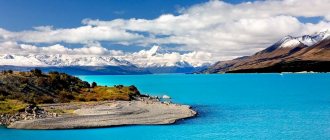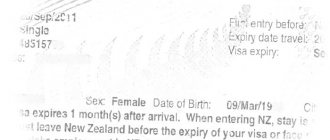Features of higher education in New Zealand
Any student can obtain higher education by graduating from preschool and school. School education lasts 13 years, so when entering a New Zealand university, you must first complete 1-2 courses in your home country. This information is relevant for people in the post-Soviet space. There are also no specific age limits for applicants.
You can apply at any age.
There are a total of 10 diploma degrees in the New Zealand higher education system. The 7th degree is awarded upon graduation from a university in New Zealand, and the final degree is awarded upon completion of a doctoral research thesis. A bachelor's diploma is issued after 3 years, and a master's degree after another 2. For specialists in the field of engineering and medicine, a longer period of study is required.
New Zealand education scheme
Key points in training:
- Anglo-Saxon model of education;
- international diplomas are issued that allow you to find work anywhere in the world;
- compared to other prestigious countries (USA, England), the price of education is more affordable;
- graduates of New Zealand universities can immediately find employment and work in New Zealand for several years to obtain a residence permit in New Zealand, if desired;
- there are scholarships and grants for training;
- studies are conducted in an international language, so you can enroll in English courses to solve this problem;
- the government strictly controls the quality of education received;
- The country has a good climate and a healthy environment, which has a positive effect on well-being.
The University of Auckland
Programs:
English language courses, bachelor's, master's, doctoral
Number of students: 29,981.
More than 7,000 international students from 120 countries of the world
Status: state Faculties : science, medicine, humanities and social sciences, architecture, business, art, education, engineering technical, legal
Interesting Facts
- New Zealand's largest university, founded in 1883.
- Consists of 8 faculties and 6 campuses.
- Winner of 5 stars with a plus in the ranking of world universities in such categories as: scientific research, teaching, student employability after graduation, material and technical base, innovation, internationalization, tolerance
Ratings
#85
in the world ranking of QS World University Rankings®
#192
of The Times world ranking for higher education and the only New Zealand university in the top 200
Top 50
in Archeology (#10 in the world), Anatomy and Physiology (#18 in the world), Education (#17 in the world), Majors related to sports (#28), Geography (#29), Law (#29), English Language and Literature (#31), Philosophy (#36), Psychology (#36) , Civil Engineering (#39), Accounting and Finance (#41), Anthropology (#41), Modern Languages (#41), Nursing (#41), Business (#43), Statistics (#43), Mathematics ( #45).
Find out about tuition fees for foreign students : undergraduate, postgraduate
______________________________________________
Types of universities, what programs are offered
There are a total of 8 institutes in the country. New Zealand has 40 industrial colleges, as well as 20 technological and polytechnic institutions that provide secondary vocational education. There are 3 wananga universities, they are not intended for visitors, only for local Maori.
There are 3 forms of education: full-time, part-time and distance learning. Three cycles of study include: bachelor's, master's and doctoral studies. The New Zealand system allows you to obtain a bachelor's degree after 360 hours of study (120 per year).
Special programs are possible, depending on the chosen specialty of the applicant.
Studying in New Zealand: description of the education system
The education system is represented by academic and language areas, combined courses. Russians will be interested in short-term options for adults/children, summer camps, secondary and higher education. Students of any direction will find the opportunity to develop in their studies, broaden their horizons, and get acquainted with the culture and customs of an amazing country.
Studying in New Zealand has an excellent price-quality ratio. A state with a developed economy and a high standard of living makes sure that educational institutions keep up with the times, strives to equip institutions with modern technical equipment, and carefully monitors international trends in matters of education.
Leading academic destinations in New Zealand:
| Stage | Directions | Cost in New Zealand dollars |
| School stage: |
| From 12000 per semester |
| Higher education: |
| From 15000 to 25000 per year |
| Short-term directions: |
| From 400 per week |
When creating and improving New Zealand's educational system, many ideas were borrowed from the British educational model. The UK is a leader in education with the best programs and effective teaching methods: the ideas of the British, as well as the experience of Europeans and Americans, have spread throughout the world. Thus, the following principles are put at the forefront of every modern educational system:
- Individual training
- Practice-theory balance
- Emphasis on comprehensive personal development
- Rich programs
- Inclusion of extracurricular electives.
One of the main priorities of the state is to ensure quality life and education. The low level of crime and corruption has made the country a leader in various TOPs, so parents sending their children on vacation or for independent study can be sure of their safe stay. Host families are thoroughly checked by the police once a month.
The cost of educational destinations here is 15-30% lower than in the USA or UK. The price range for courses is quite wide and depends on factors such as the prestige of the school, location, and course features. Additional expenses during training:
- Educational materials – about $800 NZD per year
- Participation in events and projects – from $250 NZD
- Accommodation – $195-500 NZD per week
- Meals – from $60 NZD
- Entertainment – from $200 NZD.
How to enter a university, required documents
Documents required for admission are accepted 2 times a year, before each academic semester. Typically this period lasts from November to May. What documents must be submitted by the applicant:
- Certificate of completion of 11th or 12th grade at school, along with a translated version into English.
- Certificate of completion of 1 or 2 courses at a CIS university, with translation.
- 2 photographs measuring 3 by 4 cm.
- A copy of your passport.
- Motivation letter.
- Foundation Certificate, if the student has completed training in the preparatory department.
Foundation Certificate Example
- If required, then an NCEA certificate.
- Confirmation of knowledge of an international language (you can take language courses in New Zealand).
- Letter of recommendation.
To enroll in a master's program, you need to attach a bachelor's certificate and an academic resume to these documents. After receiving confirmation of enrollment in a higher education institution, you need to apply for a study visa to immigrate to New Zealand.
This is what a student visa looks like in New Zealand
You can find out how to move to New Zealand for permanent residence by following this link.
In addition to the main list of papers, a financial guarantee is provided that the applicant has at least 10 thousand dollars in local currency for the year of study. Documents up to 3 months inclusive are considered. This is the minimum required for admission to a New Zealand university.
How to enter a university in New Zealand
The first step to entering a New Zealand university begins with choosing a specific educational institution and program of study. The geographical location of the university is of great importance. It is worth considering that in large and densely populated cities of New Zealand, for example, Auckland or Christchurch, the cost of living is much more expensive. Carefully study the different options, pay attention to the list of programs offered, access to scholarships and other types of support for international students.
There is no single centralized system for admission to New Zealand universities. For detailed information, please contact the university directly through the official website . Be sure to visit the government education portal - studyinnewzealand.govt.nz. There is a lot of useful information here, especially for foreigners interested in studying in New Zealand. Including admission requirements, field of study selection and more.
General requirements for admission to a New Zealand university
- Knowledge of English at a level sufficient for study. As a rule, international certificates IELTS (6) and TOEFL (80) are accepted.
- A certificate of complete secondary education or a diploma of graduation from a foreign university. In each case, the documents must be recognized in New Zealand. Citizens of Russia or Ukraine will most likely need to take a special preparatory course - Foundation .
Some documents are sent electronically, while some translated and certified copies are sent only by mail. If all the requirements are met, the university sends the foreigner a letter confirming enrollment and detailed information about the start date of training and details for paying for the course. After transferring funds, you can apply for a student visa at the New Zealand diplomatic office in your country. Read more about New Zealand study visas here.
How to apply for a student visa, list of documentation
Basic required documents to obtain a student visa:
- Confirmation of enrollment, as well as an invitation from the educational institution.
- A valid passport that will be valid for at least another 3 months from the end of the travel date.
- A completed visa application form, written in English. The sample is downloaded from the official website!
New Zealand Student Visa Application
- Two photographs, size 3 by 4.
- Certificate of no criminal record of the applicant.
- Medical insurance that will be valid in New Zealand while the student is there.
- An extract from a bank card confirming the student’s solvency (minimum amount – 10 thousand dollars per year in local currency).
- Fluorography, which must be completed before training. The X-ray image is attached to the main list of documents.
Website of the New Zealand Embassy in Russia – https://www.mfat.govt.nz/ru/countries-and-regions/europe/russia/new-zealand-embassy/
Website of the New Zealand Embassy in Russia
https://www.immigration.govt.nz/new-zealand-visas
These are official sources that contain all the comprehensive information on obtaining a visa to New Zealand.
Secondary education
School education is compulsory, starting at age six and ending at age sixteen. There are more than four hundred schools in the country, twenty of which are private. Primary education lasts eight years, and at the age of thirteen children begin to attend secondary schools - colleges or tertiary schools. From the 9th to the 13th grade, schoolchildren prepare to enter polytechnic institutes and universities. At the end of their studies, students take exams in 5-6 major subjects, based on the results of which they can enter a higher education institution.
In order for a Russian student to continue his studies at a school or college in New Zealand, he must submit a certificate of grades from his previous educational institution and pass an English language test. If the level of language skills is insufficient, then foreign students may be offered to take an intensive English course, after which they will be allowed to start classes at school.
Institutes of Technology or Polytechnics are very popular in New Zealand. Studying there lasts from six months to 2-3 years, and after three years of study the student receives a bachelor's degree. In addition to traditional educational programs in information technology, management, tourism and others, some technological institutes also offer specific ones. Thus, at the Eastern Institute of Technology you can master the specialty “Viculture and Winemaking.” Russians can enter the polytechnic on the basis of a secondary school certificate and English language testing, in which they must score at least 550 points on the TOEFL.
How the exams work
New Zealand universities require an IELTS certificate for every student from abroad without exception. This document confirms the appropriate level of knowledge of spoken English, which allows you to continue studying in this country without any problems. The cost of testing is $250.
IELTS Certificate
If the result is unsatisfactory, an appeal is filed.
The exams themselves at universities are held according to a credit-module system, 2 times a year, at the end of the semester. In addition to exams, there are also modules conducted 4 times a year.
Requirements for applicants
New Zealand universities accept applicants with 13 years of school education. Due to differences in the programs of different countries, universities strongly recommend completing the International Baccalaureate, New Zealand pre-university courses (Foundation) or British A-Level. International modules allow you to set a minimum threshold for admission, and completing the foundation provides an opportunity to verify the knowledge of a foreigner. You can also bypass this scheme if you complete 1-2 years of study at a university in another state. If you are determined to enter one of the 20 polytechnic institutes or colleges, then a certificate of complete secondary education is quite enough. General requirements for applicants:
- high average score, especially in specialized subjects;
- English proficiency from IELTS Academic 6.0;
- age from 18 years.
The package of documents includes:
- certificate with insert;
- language certificate;
- recommendations;
- motivation letter;
- autobiography;
- health certificate;
- information from the Ministry of Education of Ukraine: “about academic law”, “about the assessment system”.
Sometimes they ask to send a police clearance certificate, they are interested in extracurricular activities, hobbies and interests.
New Zealand tuition fees
The most prestigious and popular universities have corresponding tuition fees. Depending on what kind of education in the specialty the student will receive, the price of the educational course is 15–25 thousand dollars per year. At a polytechnic institute, the cost ranges from 10–15 thousand dollars, which is slightly lower.
If you don’t have a lot of money, but you want to graduate from a New Zealand university, you can enroll in a private institution, where the cost of education is relatively lower, about 5-10 thousand dollars per year.
For masters, the tuition fee per year is approximately 15 thousand New Zealand dollars.
The right to free education, the opportunity to receive a grant
There is an opportunity to receive a grant or scholarship, but the percentage of such students is extremely low. Only one in forty students receives any benefits from the university or the country's government.
The grant can cover half the cost of training, but only in exceptional cases is it possible to study for free. For foreigners, this chance is practically zero.
Grants are distributed in descending order of importance:
- According to the average score of the certificate.
- Average certificate score in English language proficiency.
- Successful implementation of research work.
What scholarships are there:
- According to philosophy, for eligible students - up to 10 thousand per year.
- For master's degree economists – $1,200 per year.
- Among students at Canterbury University, for 25 students, on a competitive basis - 11 thousand per year.
Principle of learning and education system
Higher education in New Zealand is modeled after the British education system. A bachelor's degree can be completed in three years, with the academic year lasting two to three semesters. Another two years are required to obtain a master's degree and three years to be able to defend a doctorate.
There are 20 main state polytechnic institutes across the country that accept foreign and local students. There is also the opportunity to study at the following universities. The largest universities in the country: University of Otago, University of Canterbury, University of Waikato.
Each university offers a broad curriculum ranging from the humanities to the sciences. For example, the University of Otago offers training in medicine, and the University of Auckland offers courses in entrepreneurship.
It is worth noting! New Zealand is developing in the direction of IT technology, so technical specialties are in high demand in the labor market.
To obtain an education in New Zealand, graduating from high school is not enough, since the local education system requires completion of 12 years of education. Therefore, for Russian students it is necessary:
- ● Complete the initial courses at a Russian university, or after receiving secondary education in Russia, begin your studies by entering college;
- ● It is possible to take Foundation preparatory courses;
- ● Obtain a certificate of completion of language courses and obtaining an intermediate level of knowledge of the English language, for example, the IELTS exam;
- ● Provide documents demonstrating the student's financial ability to pay for study and living expenses in New Zealand.
Important! Admission requirements for international applicants vary from university to university. One may require passing entrance exams, while another may require an interview.
How to live for foreign students arriving to study at a New Zealand institute
For those wishing to receive an education, there are special student dormitories. You can also get housing on a competitive basis. First of all, honors students and first-year students are served. Dorm housing rent ranges from $80 per month or more, depending on the specific educational institution.
If you can’t rent a room in a hostel, then this is not a problem. There is always the possibility of staying with a family or renting a rental property. For example, you can rent a one-room apartment from $400 a month. The estimated cost of food is from $300 per month.
Cost of preschool in New Zealand
From 6 months to 5-6 years, children in New Zealand can attend a kindergarten or nursery. There are both public and private kindergartens, where the groups are smaller and the nannies pay attention to each child.
Sending your child to a nursery or kindergarten in New Zealand is expensive: there are no benefits for foreigners, and the monthly fee is always higher than for local residents.
One month in a private kindergarten costs about 1,500 - 2,500 dollars. Additional interest groups cost approximately 1,000 – 2,000 per month.










